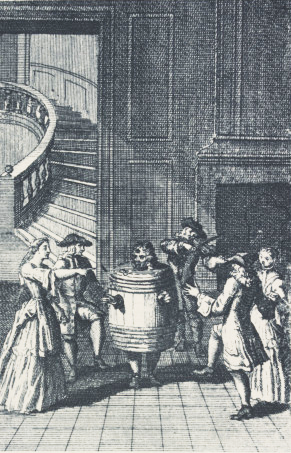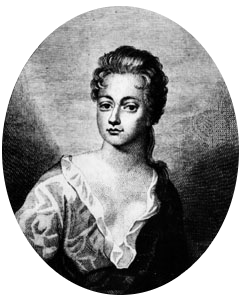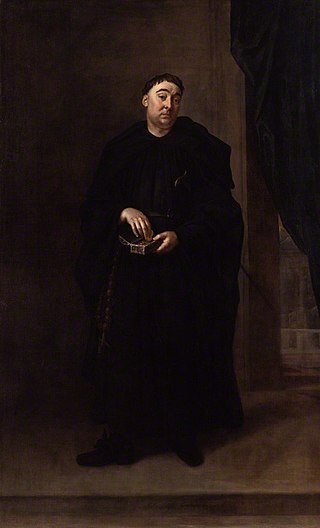Related Research Articles

"Restoration comedy" is English comedy written and performed in the Restoration period of 1660–1710. Comedy of manners is used as a synonym for this. After public stage performances were banned for 18 years by the Puritan regime, reopening of the theatres in 1660 marked a renaissance of English drama. Sexually explicit language was encouraged by King Charles II (1660–1685) personally and by the rakish style of his court. Historian George Norman Clark argues:
The best-known fact about the Restoration drama is that it is immoral. The dramatists did not criticize the accepted morality about gambling, drink, love, and pleasure generally, or try, like the dramatists of our own time, to work out their own view of character and conduct. What they did was, according to their respective inclinations, to mock at all restraints. Some were gross, others delicately improper.... The dramatists did not merely say anything they liked: they also intended to glory in it and to shock those who did not like it.
Susanna Verbruggen, aka Susanna Mountfort, was an English actress working in London.

Anne Bracegirdle was an English actress.

Cave Underhill (1634–1710?) was an English actor in comedy roles.
Samuel Sandford was an English character actor, known for his roles as villains.

Anthony Leigh was a celebrated English comic actor.
John Bowman (1651–1739) was a British stage actor. He began his career in the Duke's Company at the Dorset Garden Theatre. In 1692 he married Elizabeth Watson, who acted under the name Elizabeth Bowman. He later switched to act at the Drury Lane Theatre. He is also referred to as John Boman.
William Bowen (1666–1718) was a British stage actor. He was part of the United Company from 1689. For a time, he became known for his comic roles. He was fatally wounded in a duel with fellow actor James Quin in 1718.
Joseph Williams was an English stage actor of the seventeenth and early eighteenth century.
Elinor Leigh was a British stage actor of the seventeenth century.
Elizabeth Currer was an Irish stage actress of the Restoration Era. She was a member of the Duke's Company during the 1670s and subsequently part of the merged United Company from 1682. Although she was likely acting in London several years earlier than this, her first known role was in The Conquest of China in 1675. Due to the irregular spelling of the time her surname is sometimes written as Carrier, Corer and Currier amongst other variants.
John Wiltshire was an English stage actor of the Restoration Era. He joined the King's Company in 1675, before transferring to the rival Duke's Company in 1679 possibly as a replacement for Matthew Medbourne who was arrested in the Popish Plot and subsequently died in Newgate. From 1682 until his death he was part of the merged United Company. According to the autobiography of Colley Cibber he subsequently joined the English Army as captain and was killed in action fighting with William III's forces in Flanders during the Nine Years' War. His surname is also sometimes spelled as Wilshire.
John Richards was an English stage actor of the seventeenth century. An early member of the Duke's Company in London, he was lured away to the new Smock Alley Theatre in Dublin by John Ogilby. He was back with the Duke's at the Dorset Garden Theatre from the mid-1670s, but while in Ireland he was able to play major roles his English performances were generally supporting parts.
Thomas Percival or Percivall was an English stage actor of the seventeenth century. He was a member of the Duke's Company from 1671 to 1682 and then the merged United Company until 1686. Throughout his career he was confined to playing supporting roles, never graduating to major parts. He was the father of the actress Susanna Verbruggen. In 1693, following his retirement from the stage, he was arrested for coin clipping, a capital crime, for which he was sentenced to hang at Tyburn. The intercession of his daughter with Mary II saw his sentence commuted to transportation, but before he reached Portsmouth he died of natural causes.
Margaret Osborne or Osborn was an English stage actress of the seventeenth century She was a long-standing member of the Duke's Company from 1671, acting at Lincoln's Inn Fields and the Dorset Garden Theatre. She went to Dublin to work at the Smock Alley Theatre in 1677, but returned to the Duke's Company around two years later She subsequently joined the merged United Company in 1682 and was still acting in the 1690s.
Elizabeth Bowman was an English stage actor of the seventeenth and early eighteenth century. The daughter of Sir Francis Watson, 1st Baronet she was adopted by the actor manager Thomas Betterton. In 1692 she married John Bowman and began acting at Drury Lane the following year as Mrs Bowman. She was a member of the United Company until 1695 then joined Betterton's breakaway at the Lincoln's Inn Fields Theatre.
Philip Griffin was an English stage actor of the seventeenth century and early eighteenth century. He joined the King's Company at Drury Lane during the 1670s, and was later a member of the merged United Company from 1685. He was named as a manager at Drury Lane in 1695, but then took military service and was styled as Captain Griffin. In 1699 he went to act in Dublin as part of Joseph Ashbury's company at the Smock Alley Theatre, but was back in London where he acted until retired from the stage in 1707.
John Hodgson was an English stage actor of the late seventeenth century. He joined the United Company in 1688 and his first recorded appearance was in The Treacherous Brothers at Drury Lane in 1690. In 1695 he was one of several actors who broke away to join Thomas Betterton's new company at Lincoln's Inn Fields. His name is sometimes written as Hudson. He was married to the singer Mary Hodgson.
Joseph Harris (c.1650–1715) was an English stage actor and playwright. His earliest known performance was in the United Company's The Bloody Brother in 1685. Earlier mentions an actor named Harris are likely to refer to an earlier lesser-known actor William Harris or even the celebrated Restoration performer Henry Harris. He remained with the United Company until 1695 when he joined Thomas Betterton's breakaway company at the Lincoln's Inn Fields Theatre. He acted there until around 1705, although some reports have him still acting as late as 1715.
Charlotte Butler was an English stage actress and singer of the seventeenth century. She may have joined the Duke's Company in the 1670s, but her first definite recorded performance was in Aphra Behn's The Revenge (1680) The anonymous A Satyr on The Players describes her,
References
- ↑ Hughes p.197